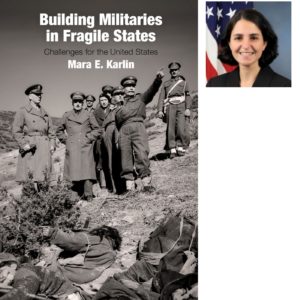Podcast: Play in new window | Download
Subscribe: RSS

Dr. Mara Karlin started her career working in the Middle East. She then went to graduate school and interned in the Pentagon on strategic issues. Eventually she served as the deputy assistant secretary of defense for strategy & force development in the Department of Defense. She is now a professor at Johns Hopkins University where she teaches in the field of Strategic Studies. This is her first book.
1:54 – Dr. Karlin was a policymaker in the Pentagon in the aughts and she worked on building militaries in Pakistan and Lebanon. She had an early interest in Middle East issues and ended up getting an internship in the Pentagon while studying at Johns Hopkins.
3:55 – The book tries to answer the question of how the US can be successful when it builds militaries in fragile states. The US is adverse to sending in its own military into fragile states. The US tries to work with the militaries in these fragile states. Dr. Karlin looked at various case studies from history.
5:19 – She looked at Asia, Europe and the Middle East. The big failure example is the South Vietnam in the 1950s. If the US had succeeded in building the South Vietnam military then the war could have been avoided.
7:15 – Two other failures are Lebanon in the 1980s and in Iraq in recent years. The closest thing to success is US efforts in Greece after WWII.
9:06 – The US got deeply into Greece’s military affairs. That transformed the Greek military and enabled them to beat guerillas and the US didn’t have to send in troops.
15:13 – There were different levels of cooperation. Institutional and strategic versus operational and tactical. People think that the US only started developing foreign militaries after 9/11.
17:28 – More desperation in a government makes foreign countries more willing to listen to what the US has to say.
21:23 – The US goes through stages of increased and decreased support for foreign militaries. However, the US shows consistency in security goals since WWII. Only recently have security issues been inconsistent.
25:25 – Bipartisan agreement on security affairs has recently begun to diminish.
29:38 – The document she found that hit heard the hardest was finding a declassified CIA agency study of a gap in Beirut where attackers were sneaking through to attack their enemies. She also found information on a US official who wanted to stage a coup in Lebanon.
33:31 – She really enjoyed studying the development of the Lebanese military work she had done years before.
36:35 – Body count ideas developed in the Vietnam War has affected how the US has approached building foreign militaries. Recently, the US is shifting away from this quantitative approach to this issue.
39:00 – Dr. Karlin had to apply a paradigm shift to her initial hypothesis.
42:30 – Dr. Karlin discusses Reagan’s decision to have the USS New Jersey launch strikes in Lebanon.
45:35 – Dr. Karlin discusses why Lebanon and its military development is important to the US.
For more “Military History Inside Out” please follow me on Facebook at warscholar, on twitter at Warscholar, on youtube at warscholar1945 and on Instagram @crisalvarezswarscholar
Guests: Dr. Mara Karlin
Host: Cris Alvarez
Tags: military, history, military history, conflict, war, interview, non-fiction book, United States, France, Lebanon, Vietnam, Greece, Iraq, Syria, stabilization, strategic studies

 Dr. Chiara Ruffa has recently published a book about military culture. It’s based on her research with French and Italian military units that had deployed to Lebanon and Afghanistan. I spoke to her about the book.
Dr. Chiara Ruffa has recently published a book about military culture. It’s based on her research with French and Italian military units that had deployed to Lebanon and Afghanistan. I spoke to her about the book.